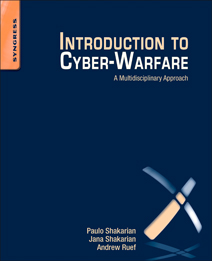Author: Paulo and Jana Shakarian and Andrew Ruef
ISBN No: 9780-12407-8147
Review date: 19/04/2024
No of pages: 336
Publisher: Syngress
Publisher URL:
http://www.elsevier.com/
Year of publication: 20/08/2013
Brief:
Introduction to Cyber-Warfare
Everybody’s at it – allegedly. Denial of service attacks, cyber-espionage, hijacking of websites, tampering with Iranian fuel enrichment plants, even. It’s world-affecting, sensitive stuff. It is, as the American authors of an ‘introduction to cyber-warfare’ put it, well-documented (and indeed much re-hashed). How do people, countries, actually do cyber-war? The authors suggest few studies have tackled this: “We wanted to understand how cyber war was being conducted, what type of cyber operations seemed to be useful in a conflict, and under what circumstances nation-states and non-state actors engaged in these operations.” Why does this matter to you, humbly (let’s say) making sprockets in Halifax? You may however be a small part of a much larger defence or other contract work for the state or some business that China, Russia or whoever are making their business to steal from. The authors begin by arguing that ‘cyber warfare can pose a serious threat to national security’. And to make a comparison from the 1939-45 war, your business may be selling flowers, but if your shop is next to a dockyard, you may well be caught in the bombing. Your computer network may be in the front line, if a foreign country decides that it is and seeks to plant malware in your system, to steal intellectual property. As with any work on IT security or IT at all, it’s in danger of being out of date almost as soon as it’s in print. This book feels as if it can stand the test of time. For one thing, it’s not quite a new subject: ‘political cyber attack’ came of age in 2007,they argue. Attacks may be good old-fashioned social engineering, trying to exploit your keenness to sign on to Facebook as ‘friends’, or other such social networks; or hackers seeking to enter industrial control systems, such as the SCADA systems that run water works, or power stations.
What could easily have been a difficult and long-winded read, is nothing of the sort. The authors offer plenty of further reading and food for thought. They sum up: “We are only at the beginning of a new era of information security that will likely change many times before reaching some sort of steady state – if such a steady state is even possible.” What is more worrying – that countries will use cyber-warfare to position themselves better, in case of a war; or they use cyber-warfare rather than ‘military ground operations’ – real war, to you and me?
Introduction to Cyber-Warfare: A Multidisciplinary Approach, by Paulo and Jana Shakarian and Andrew Ruef. Published 2013 by Syngress. Paperback, ISBN: 9780-12407-8147, 336 pages, £30.99. Visit www.elsevier.com.










